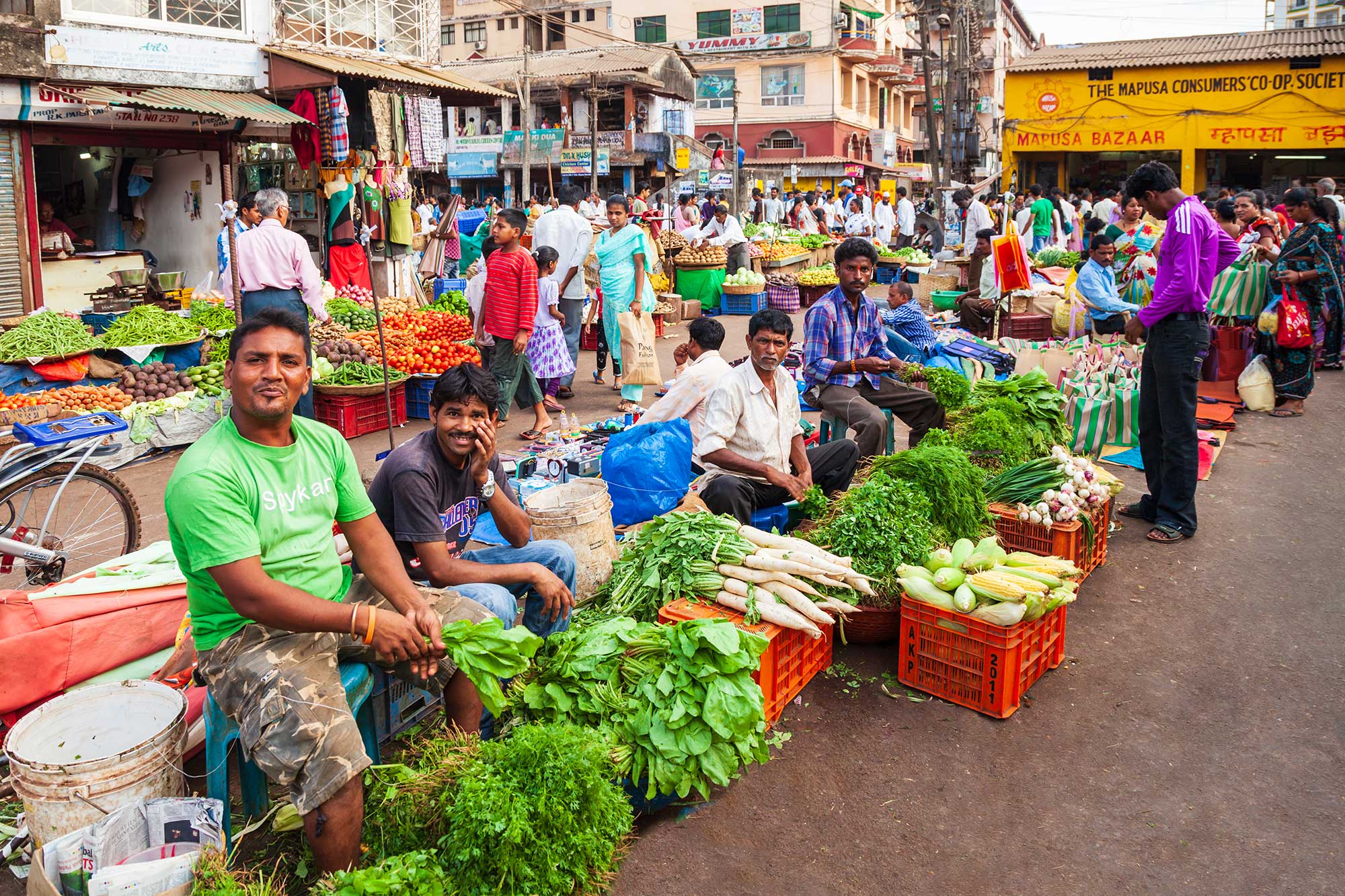Introduction
The Informal food sector is playing an important role in the national economy of India. An informal economy is the part of any economy i.e. neither taxed nor monitored by any form of government. Although, the informal sector makes up a significant portion of the economy in developing countries, it is sometime stigmatized and unmanageable.
The food supply chain in the informal sector refers to the network of activities and processes involved in producing, processing, distributing and selling food outside the formal and regulated market systems. In most of Asian countries, the informal food supply chain has dualistic structure with majority of the market share being traditional and small quantum being modern. As such, informal food supply chains complemented the formal food industry, its networks and was an unofficial part of food supply security with “tolerable” health risks.
Informal food supply chains existed since humans moved from being hunter-gathers to farming, grazing animals and producing food. Excess from daily harvests from market gardens are traded or sold to neighbours and the general community even today, since the produce or products are freshly harvested and affordable.
Informal food sector is characterized by Small Scale Venders, Local Markets/ Traditional Market and street food, small food hotel, tea stall and unregistered or non-compliant enterprizes. It plays an important socio economic role in meeting food and nutritional requirements of consumers at less prices to the lower and middle income people. Homemade and street foods are described as wide range of ready to eat foods, usually sold by venders and hawkers in the streets. Women are more often active in informal employment than men. The informal sector is playing the vital role in country of the diverse culinary preferences of the population. The Law of food safety and quality leaves out the conditions and mechanism on managing and ensuring safety, quality, sanitation and literacy of food in all steps of food processing to take the health and safety of consumers as well as guarantee fair trade in food industries.
Main sectors of informal supply chains
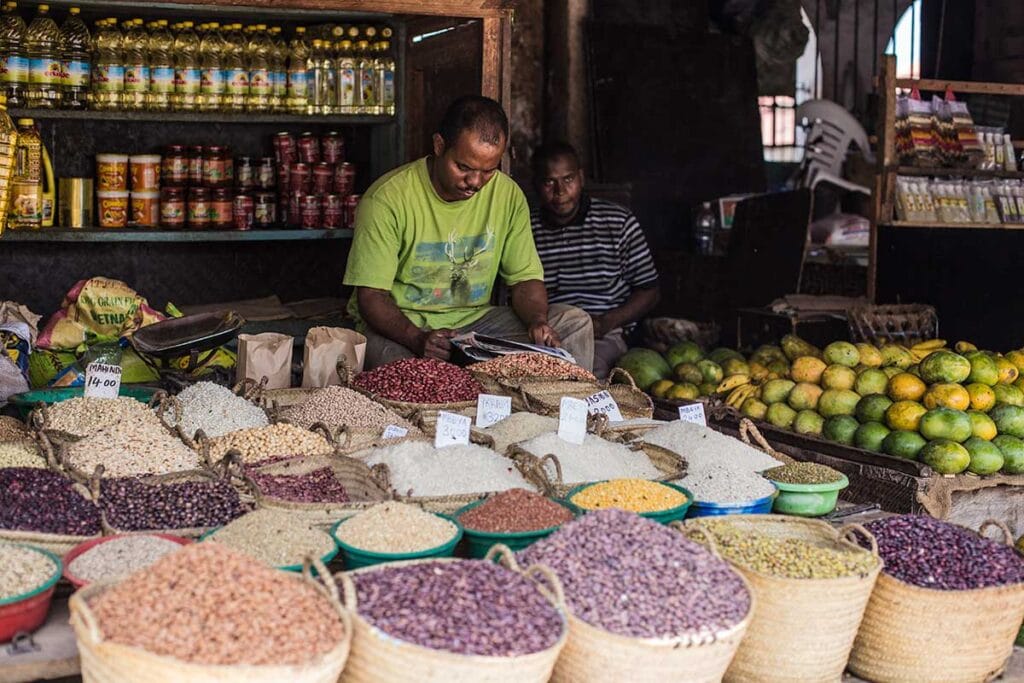
The main sectors of food supply chain are sources, intermediaries and Retail. The sources include production (farming) and wildcatch. Intermediaries include farm produce collector, wholesaler, Retailer and market vendor. Whereas Retail includes wet market, supermarket and convenience stores.
Risk management of food quality and safety issues are required to be addressed at every stage of these sectors to achieve overall objectives and success. Easing bank loans, use of agriculture technology, online business and directly buying from farmers may improve food safety and quality in informal sector.
Market chains types
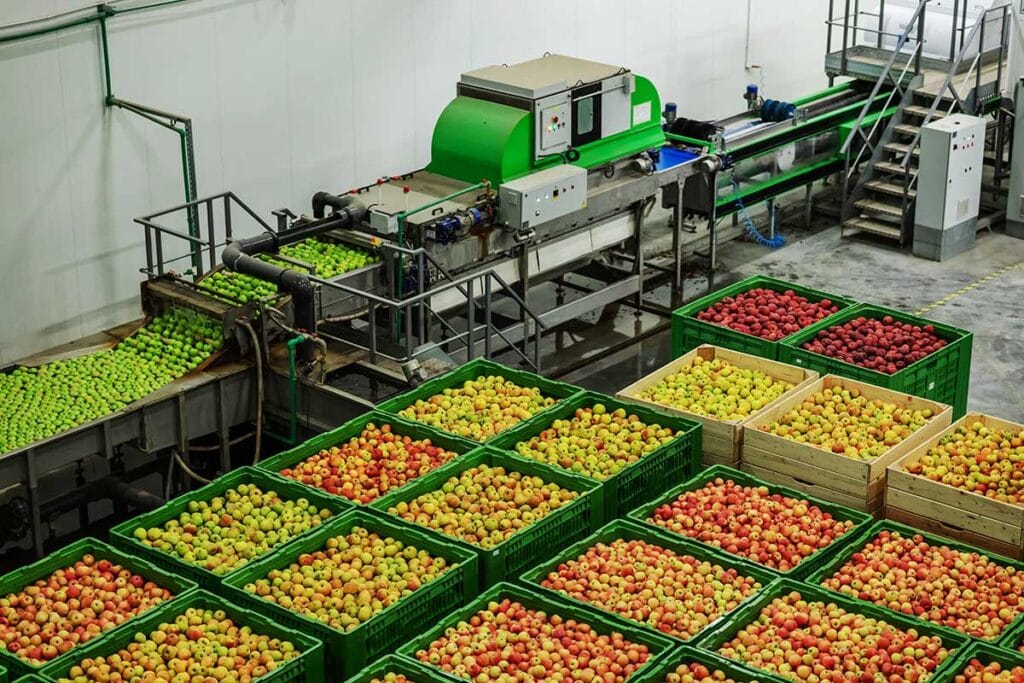
Wet and Dry market chains
Fresh produce sales locations were later referred to as “Wet” markets as ice used to cool products which wet the floors as well.
“Dry” section of the market sold sauces, and “dry” produce eg. Garlic, onions, potatoes, etc which do not require ice to be used.
Modern market chains
The modern market chain relies on the formal flow of information and guarantees stable supply through contact farming. The main difference between the traditional and modern chain is highlighted by high quality products that are supplied to modern retail channels such as supermarkets and exports. Food safety and traceability, quality assurance and freshness are the primary attributes that set these products apart to attract higher income consumer.
To achieve these attributes, the modern chains took a more coordinated approach to procurement, utilizing contract farming or other organizational structures to manage production and to transfer technologies and knowledge. Agribusinesses as modern suppliers link smallholder farmers to modern supermarkets by setting up a network of farmers and investing in local pre-processing and packaging operations.
Challenges in informal food supply chain
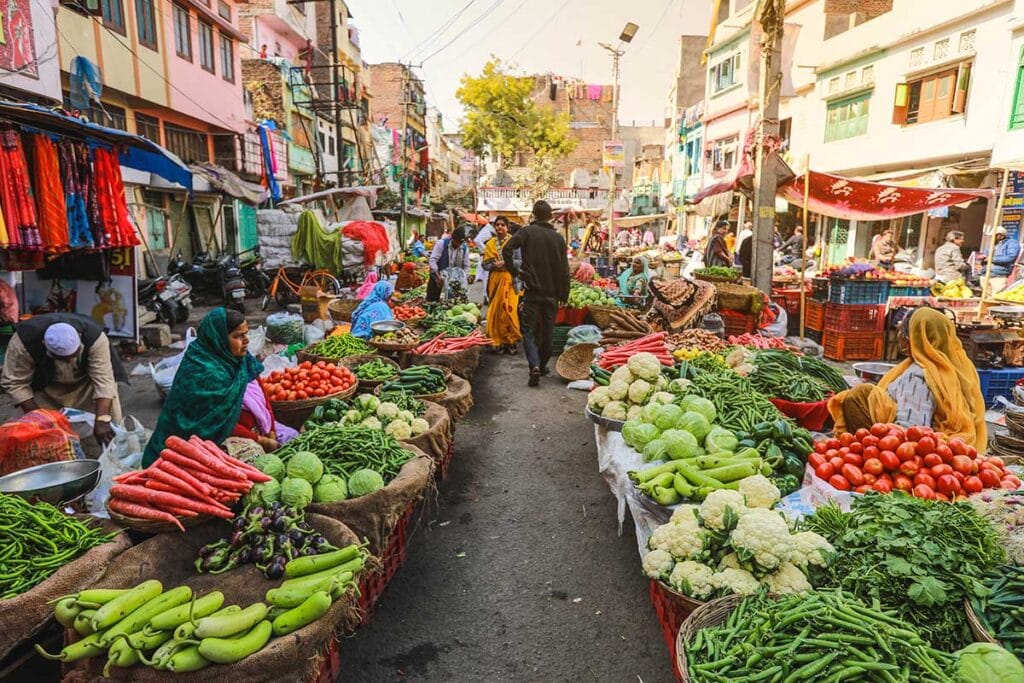
- Lack of standardization:
The absence of standardized practices in the informal sector poses a risk to food safety and quality and to conduct food safety practice. - Limited regulatory oversight:
The regulatory oversight is limited in the informal sector, make it challenging to enforce and ensuring adherence to safety standards. - Infrastructure issues:
Inadequate infrastructure, including storage and transportation facilities, hampers the maintenance of food quality throughout the supply chain. Professional know-how required on handling, transporting and managing infrastructure.
Common Challenges and recommendations in food supply chains
Main challenges and recommendations in a typical food supply chain are summarized in the table given below:
| Key areas | Challenges | Recommendations |
| Production | Packaging, sorting, old equipments, lack of mechan- ization, lack of raw material & knowledge, funding, | Standardization of products, setting of new markets, role of regulatory oversight agencies, training & capacity building to farmers – technical assistance, availability of raw material |
| Warehousing | Storage, infrastructure, material handling equipments, temp- erature control, lack of trained manpower | Equip warehouse with required technologies, effective inhouse logistics mechanism, cold storage facility, tracking system, modern assembly lines, temperature control. |
| Logistics | Lack of transportation, information flow, planning, road network, training & awareness program | Remove multilayered-middlemen from the entire supply chain, ensure accessible and affordable logistics system including transportation and warehousing facility in the entire supply chain, clustering & cooperatives by group of small farmers. |
Challenges to Improve “Food Safety” & “Quality” of Food Supply
- Making the transition from traditional chain towards a modern chain very difficult because improved production management means a higher level of attention and care from highly skilled farmers and workers is needed.
- The production of vegetables in the traditional chain remains significantly cheaper than in the modern one because quality monitoring and assurance by the modern chain add to the cost of production and distribution, while the use of chemicals by smallholders in the traditional chain can reduce labour intensity and costs.
- On top of this, consumers do not perceive the benefits of higher quality and safer products and still prefer inspecting the products themselves.
Importance of Education and Training in informal food supply chains
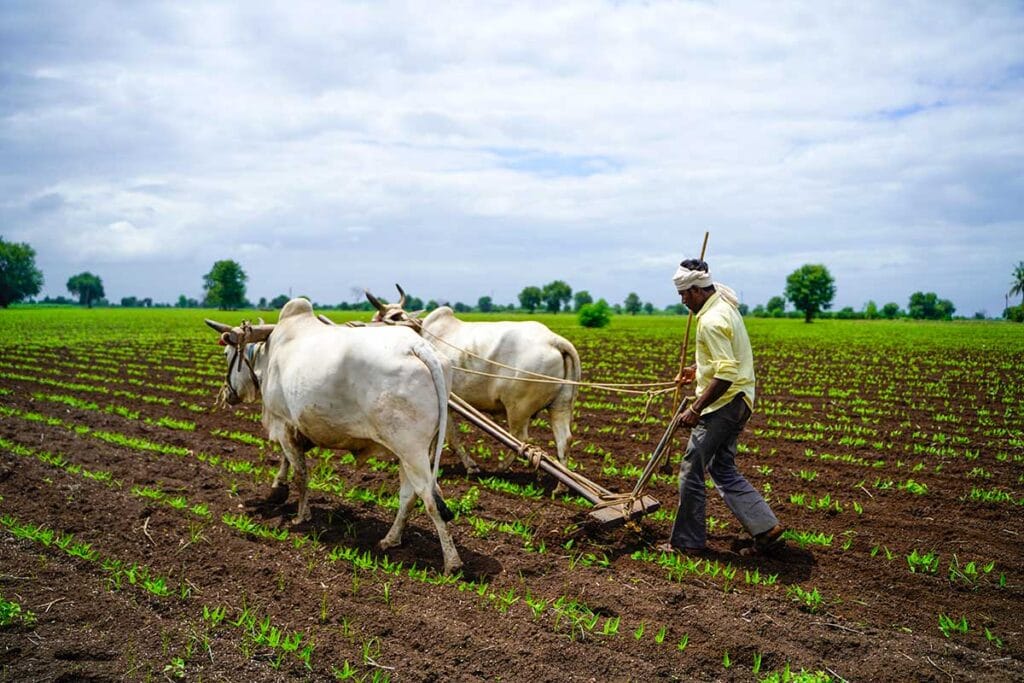
- Food safety and Quality: Training and eduction can raise awareness about the importance of maintaining high standards of food safety and quality in the informal food supply sector.
- Compliance with regulations: Many informal food businesses may not be fully aware or compliant with existing regulations. Structuring awarenesshelps them understand and adhere to relevant food safety and hygiene standards.
- Entrepreneurial Development: Education and training can empower individuals with the skill and knowledge needed to run their businesses more efficiently.
- Market access and expansion: Awareness program can facilitate better market access for infomal food suppliers by helping them understand market demands, consumer preferences and supply chain dynamics.
- Community health and Nutrition: Structured awareness program4s can highlight the nutritional value of different food products, promoting healthier eating habits within communities.
- Technology Adoption: Awareness program can introduce and propmote the use of technology that can help in improving efficiency, traceability and communication within supply chain.
- Sustainability Practices: Training initiatives can propmote sustainable agricultural and food production practices, helping to minimize the environmental impact of the informal food supply sector.
- Social Equity and Inclusion: Education and training can contribute to social equity by providing opportunities for marginalized groups, such as women and minority communities, to participate more actively in the informal food supply sector.
- Consumer empowerment: Targeted consumer awareness programs empower individuals to make choices aligned with their values, such as supporting local businesses, promoting sustainable practices and making informed decisions about their food consumption.
- Community Engagement: Training and awareness program can encourage local communities to support & patronize businesses by contributing to community development.
- Business Development: Education and training can equip individuals in the informal food supply sector with essential business skills, such as marketing, financial management and customer service.
Recommended Actions to Improve Food Safety and Quality
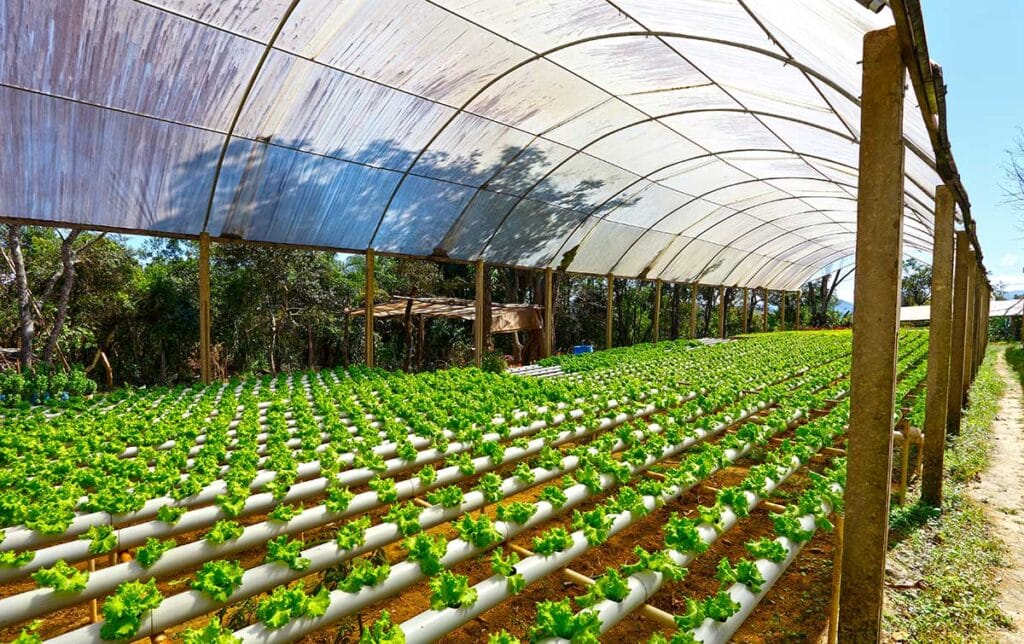
- Promoting Awareness: Implement awareness campaigns to educate both vendors and consumers about the importance of food safety and quality.
- Capacity Building: Provide training and capacity-building programs for vendors to enhance their understanding of best practices in food handling and storage. Train producers in agricultural practices and in technical and health standards.
- Regulatory Strengthening: Collaborate with relevant stakeholders to strengthen regulatory frameworks, ensuring better oversight and enforcement in the informal food sector.
- Infrastructure Development: Invest in the development of infrastructure, including storage and transportation facilities.
- Providing appropriate area to the sale of food: Maintain food safety and public hygiene safeguard environment to prevent contamination of food.
- Enhance Food Quality: Promote the availability of wide range of fresh and healthy products, Develop urban and Peri-urban food production with the direct investment of community “Charia: of products/response to specific nutrition seeds.
- Traceability: Developing a traceability process for the production of fruits and vegetables.
- Policy initiatives: Making policies to support the production of organic farms such a free advice and free licensing of GAP and organic farm standards.
Way forward
Informal networks in food supply and retail, low-cost transportation / distribution, processing and agricultural productionprovide a base source of nutritious food. Often large population in Asia who depend on food sourced from smallholder growers providing affordable food and rural income.
As such, stabilizing yields, building capacity while managing crops, together with improved logistics / transport infrastructure, promoting productivity and sustainability are vital to local producers / farmers especially the indigenous and rural people in Asia.
There is an urgent need to set up knowledge-based governance and inter-connectivity to ensure resilient and affordable, socio-culturally inclusive access to food supply.
Incentives, training, education, media attention and the use of available handheld technologies should be included in the strategic goal achievements for overall success of the informal food supply sector.
*****


